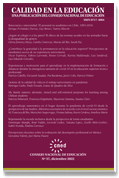Mother Perspectives on Home-Learning Mathematics during COVID-19 Pandemic: Different Scenarios Depending on SES
DOI:
https://doi.org/10.31619/caledu.n57.1252Keywords:
COVID-19, math learning, home math activities, SESAbstract
The school closures in response to COVID-19 pandemic affected the in-person school attendance of Chilean children. Consequently, mothers became the main support for their primary school children"s learning. Given that mathematical skills are central to later academic achievement, this article seeks to understand, according to a maternal perspective, how children learned mathematics during this period. Semi-structured interviews were conducted with 14 mothers of 3rd Grade children from different socioeconomic levels (SES). The interviews covered topics such as the type of classes children received, home resources for learning, and type of support that was necessary, among others. The results show that schools offered different types of classes and teaching resources that varied according to the SES of the families. They also showed that mothers oversaw school support in mathematics, but sometimes they asked fathers for help when they felt unsure about teaching this subject. Finally, the findings highlight that the home resources to support mathematical learning also varied greatly according to family SES. Summarizing, these results reveal that children from the most vulnerable groups had fewer opportunities for learning mathematics.
Downloads
Published
Issue
Section
License
Authors retain their Copyright and only transfer a part of these to the journal, accepting the following conditions:
Authors keep their rights as authors and guarantee the right to the journal for the first publication of their work, which is simultaneously subject to the Creative Commons Attribution license allowing third parties to share the study accrediting the author and first publication in this journal.
Authors may adopt other non-exclusive license agreements for distribution of the version of the published work (e.g. inclusion in an institutional thematic file or publication in a monographic volume) accrediting initial publication in this journal.
Authors are allowed and recommended to share their work over the Internet (e.g. in institutional telematic files or their website) before and during the submission process, which may lead to interesting exchanges and increased citation of the published work. (See The effect of open access).

